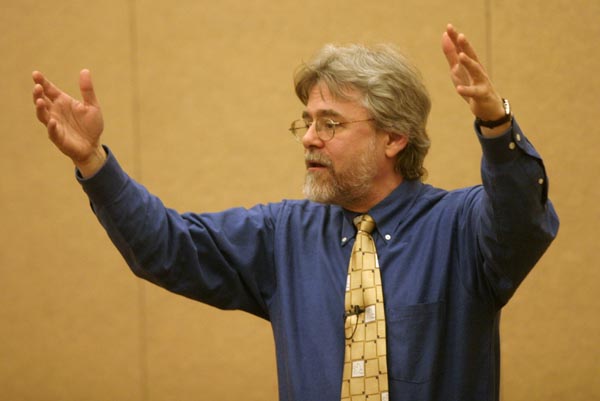Selling Books & Giving a Talk: Teaching Faithfully at a Christian College

After the requisite heavy lifting, I'm taking a rented van full of boxes of books out to Western Pennsylvania to the Reformed Presbyterian-owned Geneva College. (Yes, our hefty family van finally died with about 240,000 hard miles on it, and we are in a bit of confusion what to do next.) I will set up a book display for their faculty to have some sort of buyin' frenzy. I hope I bring home less than I take, at least.
Tuesday affords me, due to the gracious and trusting hospitality of their Academic Dean, the chance to do a lecture for their faculty. As I've done with under-grads, and occasionally with college staff, I get to offer some reminders of the urgency and obstacles facing those that are called to the challenge of integrating faith and learning in a collegiate setting.
I have often lamented the way in which Christian persons, even professionals and leaders, don't read much about their respective fields; that is, few Christian [fill in the profession: doctors, salespeople, teachers, journalists, engineers, artists or lawyers] can articulate what difference their faith makes for the ways in which they think about, and live out, their careers and callings. Because this question has not captured their imaginations, they just don't consider the importance of reading books on the interfaces and implications. Perhaps it would help if there were pastors (or booksellers?) framing their understanding of their jobs as being a Christian doctor or politician or coach or businessperson, rather than just being a doctor, politician, coach or businessperson who happens also to be a Christian.
You can see that if we desire to live out a view of the Kingdom of God where professionals (and others!) are salt and light Christians who read widely and think deeply about the relationship of faith and work, worldview and way of life, then it would be very helpful if their mentors in their college years help get that conversation started, and offer uniquely Christian insights and distinctively Christian notions that would influence their earliest thinking about their fields. This is the high calling of, at least, Christian college professors. At least that is what I'm going to preach to the Genevans.
Ahhh, but where do such professors learn such integration? Where did they do their Ph.D. work? In a place that was conducive to Christian scholarship? Probably not. In a place that was hostile to the gospel? Very likely. A new hire at a vibrant church-related college, or an evangelical institution--even the famous ones like Wheaton and Calvin and Eastern--are asked to think faithfully and creatively about the foundations of their fields, and learn a Christianly shaped vocabulary about their disciplines. And they are to teach this alternative stuff in a Christian manner, no less. They come from largely secularly-spirited learning environments, and, presto, they are supposed to be Christian college teachers with this integrated worldview and wholistic vision and uniquely Christian pedagogy?
I grow frustrated that many Christan lay people don't have much to say when asked how they live faithfully in their work, careers and callings, but I ought not too quickly blame even the evangelical professors. Everyone has inherited an anti-intellectualism, a heritage of bookstores without theological substance, preachers who are more moralistic than prophetic, and a dualism that implies that ordinary people in ordinary jobs only have to learn to be honest and nice and perhaps invite people to church. The connection between Sunday and Monday is shallow at best, and not too many churches make things much better. So we can't just blame the less than revolutionary fruit on less than radical Christian colleges.
I cannot wait for the privilege of sharing with these valiant Christian teachers at this small principled college in this rough blue-collar town. If there is hope for a renewal of the Christian mind, in service to God's coming Kingdom of renewed shalom, if academic learning is to be distinctive and service-oriented, such relevant and faithful learning will come from places like this. That these professors will gather together to think hard about the ways they can contribute to the renewal of the Christian mind and the restoration God may bring to Christ's broken world, is a sign of great hope. Please pray for them, for college teachers and student affairs folks, for campus workers and students. And for me, since we long to sell good books in their important places. It is a long haul, in more ways than one. But I have great hope, and our trip to Geneva College is an example of how our little business tries to make an impact in ways that may ripple into lives and institutions and cultures near and far.
There are many, many books that reflect on Christian higher education, and we carry plenty. If you know any college staff, please send us an email if you want suggested readings. You have seen the books that we've promoted for students, written by Geneva teacher Donald Opitz and CCO staffer Derek Melleby, The Outrageous Idea of Academic Faithfulness and their terrific, ever-expanding website, www.academicfaithfulness.com. (You know, if teachers read this, as simple as it is, they'd be a good way down the road on this journey, and I shall commend it to Don's colleagues at Geneva! I will similiarly commend it to a pastor's gathering later this fall.)
You may want to know that that book's title (that you see blinking over to the left, still) drew its title from the small but significant book by George Marsden, published by Oxford University Press, called The Outrageous Idea of Christian Scholarship. George got that title, by the way (which rather proves a point I made above) when a New York Times reviewer of his prestigious book on the history of higher education noted that Marsden's claim to do "Christian scholarship" was---and I quote---"outrageous." Oxford then invited Dr. Marsden to do a book on that. It documents this recent movement of "thinking Christianly" about various academic disciplines and measures the impact Christian scholars are making in the humanities, the arts, and the sciences. Opitz & Melleby essentially wrote a student version of that impressive Oxford volume.
To show you how varied our reading can be in this field, though, let me note one new book I've almost finished, which I found very, very interesting.
The State of the University: Academic Knowledges and the Knowledge of God Stanley Hauerwas (Blackwell) $34.95. One chapter was especially interesting, "What Would a Christian University Look Like: Some Tentative Answers Inspired by Wendell Berry." My favorite, though, was "Carving Stone, or Learning to Speak Christian." You may recall his earlier comments in After Christendom about bricker layers (drawing on Alister McIntyre, of course) and his realization that their way of passing on knowledge---not abstracted---was instructive for the life of the church. His description here of a book about several generations of stone carvers was just splendid. Another great chapter, from a speech he gave at Baylor, was fabulously called "Pro Ecclesia, Pro Texana: Schooling the Heart in the Heart of Texas." His insightful and clever (and controversial) insistence that "schooling the heart" and teaching ethics is bad for people is classic Hauerwas. The final chapter is called "To Love God, the Poor, and Learning: Lessons Learned from Saint Gregory of Nazianzus." Now that is a set of loves I long to learn, even if it takes a lifetime.





<< Home